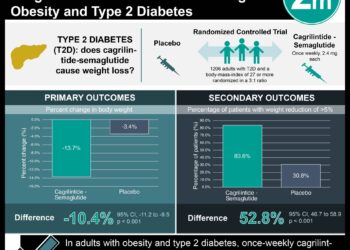Glucagon-like peptide-1 receptor agonists associated with lower depression risk in older adults with diabetes
1. In this target trial emulation, glucagon-like peptide-1 receptor agonists (GLP-1RAs) were associated with a lower risk of depression compared with dipeptidyl peptidase-4 inhibitors among older patients with type 2 diabetes.
2. GLP-1RAs were associated with a similar reduction in risk of depression compared with sodium-glucose cotransporter-2 inhibitors.
Evidence Rating Level: 2 (Good)
Study Rundown: Glucagon-like peptide-1 receptor agonists (GLP-1RAs) have been associated with various effects in treating type 2 diabetes (T2D), including cardiorenal benefits and weight loss. They are known to cross the blood-brain barrier and exert central dopaminergic effects, which raises concerns that they may also give rise to psychological harms such as depression and suicidality. Although pre-clinical studies suggest that GLP-1RAs may have antidepressant effects, population-based studies have shown mixed results. This study aimed to determine the risk of depression in older adults with diabetes on GLP-1RAs compared with sodium-glucose cotransporter-2 inhibitors (SGLT2is) and dipeptidyl peptidase-4 inhibitors (DPP4is). It was found that GLP-1RAs were not associated with a significant change in risk of depression compared with SGLT2is. However, GLP-1RAs were associated with a one-tenth reduction in depression risk compared with DPP4is. Notably, subgroup analyses showed that the risk of incident depression among patients on GLP-1RAs decreased with longer treatment duration compared with both SGLT2is and DPP4is. The generalizability of this study was limited by its broad patient inclusion criteria; the possibility of unmeasured confounding; the relatively short median follow-up; and its focus on older adults. Nevertheless, this study suggested that GLP-1RAs could have antidepressant effects, particularly with longer treatment durations, thus making them a potential tool for treating diabetes in those at risk for depression.
Click to read the study in AIM
Relevant Reading: Glucagon-like peptide 1 (GLP-1) receptor agonists as a protective factor for incident depression in patients with diabetes mellitus: A systematic review
In-Depth [retrospective cohort]: This target trial emulation investigated the risk for depression among older patients initiating GLP-1RA treatment compared with SGLT2is and DPP4is. Inclusion criteria were patients aged 66 years or older newly beginning treament with GLP-1RAs, SGLT2is, or DPP4is. Exclusion criteria included diagnosis of type 1 diabetes; end-stage renal disease or dialysis; preexisting depression or other mood disorders; use of antidepressants within 1 year prior to treatment initiation; and concomitant use of GLP-1RAs and control medications. After propensity score matching, risk for incident depression over time was calculated using Kaplan-Meier plots. A total of 14,665 pairs of patients were generated for comparing GLP-1RAs with SGLT2is, and 13,711 pairs were generated for comparing GLP-1RAs with DPP4is. In the GLP-1RA versus SGLT2i cohort, 961 GLP-1RA users and 902 SGLT2i users developed depression, yielding incidence rates of 49.02 and 45.54 per 1000 person-years for GLP-1RA and SGLT2i, respectively (rate difference, 3.48 per 1000 person-years [95% CI, -0.81 to 7.78]; hazard ratio [HR], 1.07 [95% CI, 0.98 to 1.18]). In the GLP-1RA versus DPP4i cohort, 963 GLP-1RA users and 1075 SGLT2i users developed depression, yielding incidence rates of 51.39 and 57.17 per 1000 person-years for GLP-1RA and SGLT2i, respectively (rate difference, -5.78 per 1000 person-years [95% CI, -10.49 to -1.07]; HR, 0.90 [95% CI, 0.82 to 0.98]). Within the subgroup analyses, patients on GLP-1RAs with longer treatment durations were associated with lower incident depression risk compared with both SGLT2is (HR for <0.5 years, 1.18 [95% CI, 1.04 to 1.33]; HR for ≥1 year, 0.84 [95% CI, 0.71 to 1.00]) and DPP4is (HR for <0.5 years, 1.08 [95% CI, 0.96 to 1.22]; HR for ≥1 year, 0.70 [95% CI, 0.59 to 0.82]). Overall, this study suggested that GLP1-RAs may have a similar effect on depression risk compared with SGLT2is, with a potential increase in effectiveness with longer treatment durations.
Image: PD
©2025 2 Minute Medicine, Inc. All rights reserved. No works may be reproduced without expressed written consent from 2 Minute Medicine, Inc. Inquire about licensing here. No article should be construed as medical advice and is not intended as such by the authors or by 2 Minute Medicine, Inc.







